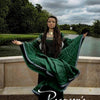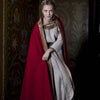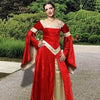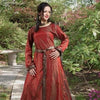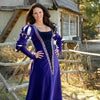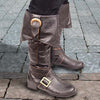Medieval Accessories Help Give Status To Your Costume
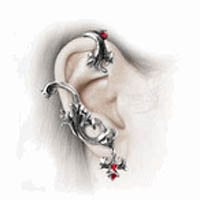
Using Medieval Accessories to Complete a Costume Medieval accessories help to complete the look for a costume. Popular ensembles include pirate, wench, bride, princess, queen, king, knight, bowman and merchant. Renaissance and Medieval costumes are popular for fairs, plays, parties and for romantic events such as dances and weddings.
Attention to the time period, social station and activities of the character helps to ensure an authentic look. The magic of costuming is in the details. With the right Medieval accessories, a costume for a man, woman or child comes to life.
Medieval Accessories for Women
The right crown, tiara or circlet provides the shining headpiece for a royal woman. A circlet was a delicate strand worn over a woman's hair. It was often jeweled. This style makes an attractive and easy to wear option for a princess costume. Crowns and tiaras have commanding presence and were generally formed of metal and often feature inset jewels.
Earrings and necklace sets made from precious and semi-precious stones enhance the outfits of wealthy women. Drop earrings and delicate or bold necklaces make a statement about a woman's station in her world. Magic rings or medallions add to the fun in fantasy role play.
Medieval accessories for Men
Wealthy men, such as kings, princes, nobles and successful pirates often sported bold jewelry. It is not uncommon for a wide metal collar worn over the chest, big rings and medallions ornament their clothing. The type of jewelry and accessories a man wears signals his station. A king's crown tends to be larger and bolder than a queen's crown, and although the crowns of princes are smaller than the king's, they serve to announce their royal status. A baron's bejeweled crown proclaims his wealth and power.
Among the handiest Medieval accessories, pouches, also called sporrans, serve the practical purpose of keeping a modern person's wallet while in costume. The sporran is generally worn front and center, on a low-slung belt around a kilt or tunic. As a pouch, this handy leather bag can be worn at the waist or hip for easy access to the coin purse to pay for ale, meat or pie.
Attention to the time period, social station and activities of the character helps to ensure an authentic look. The magic of costuming is in the details. With the right Medieval accessories, a costume for a man, woman or child comes to life.
Medieval Accessories for Women
The right crown, tiara or circlet provides the shining headpiece for a royal woman. A circlet was a delicate strand worn over a woman's hair. It was often jeweled. This style makes an attractive and easy to wear option for a princess costume. Crowns and tiaras have commanding presence and were generally formed of metal and often feature inset jewels.
Earrings and necklace sets made from precious and semi-precious stones enhance the outfits of wealthy women. Drop earrings and delicate or bold necklaces make a statement about a woman's station in her world. Magic rings or medallions add to the fun in fantasy role play.
Medieval accessories for Men
Wealthy men, such as kings, princes, nobles and successful pirates often sported bold jewelry. It is not uncommon for a wide metal collar worn over the chest, big rings and medallions ornament their clothing. The type of jewelry and accessories a man wears signals his station. A king's crown tends to be larger and bolder than a queen's crown, and although the crowns of princes are smaller than the king's, they serve to announce their royal status. A baron's bejeweled crown proclaims his wealth and power.
Among the handiest Medieval accessories, pouches, also called sporrans, serve the practical purpose of keeping a modern person's wallet while in costume. The sporran is generally worn front and center, on a low-slung belt around a kilt or tunic. As a pouch, this handy leather bag can be worn at the waist or hip for easy access to the coin purse to pay for ale, meat or pie.

